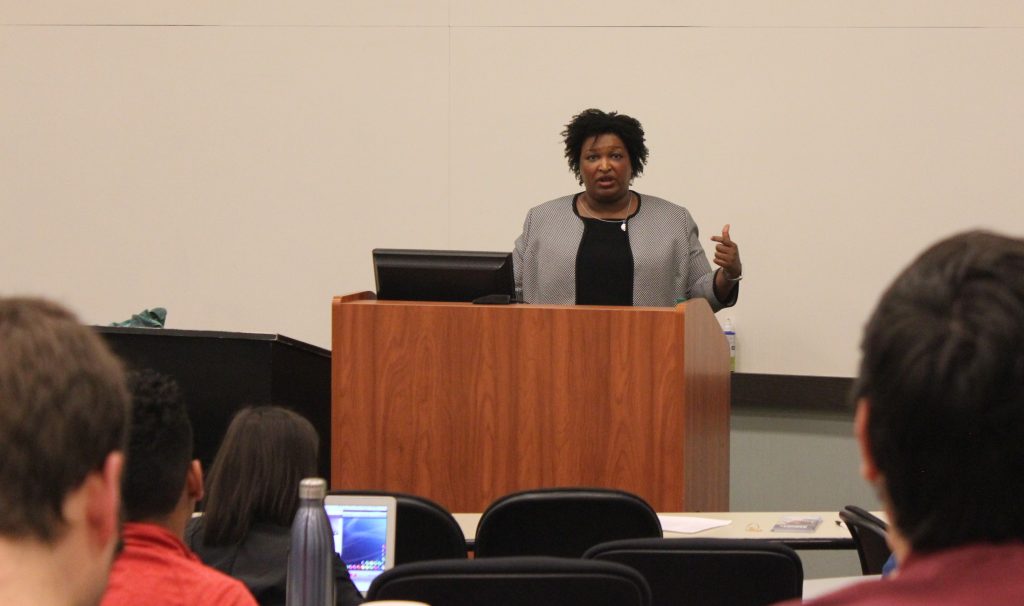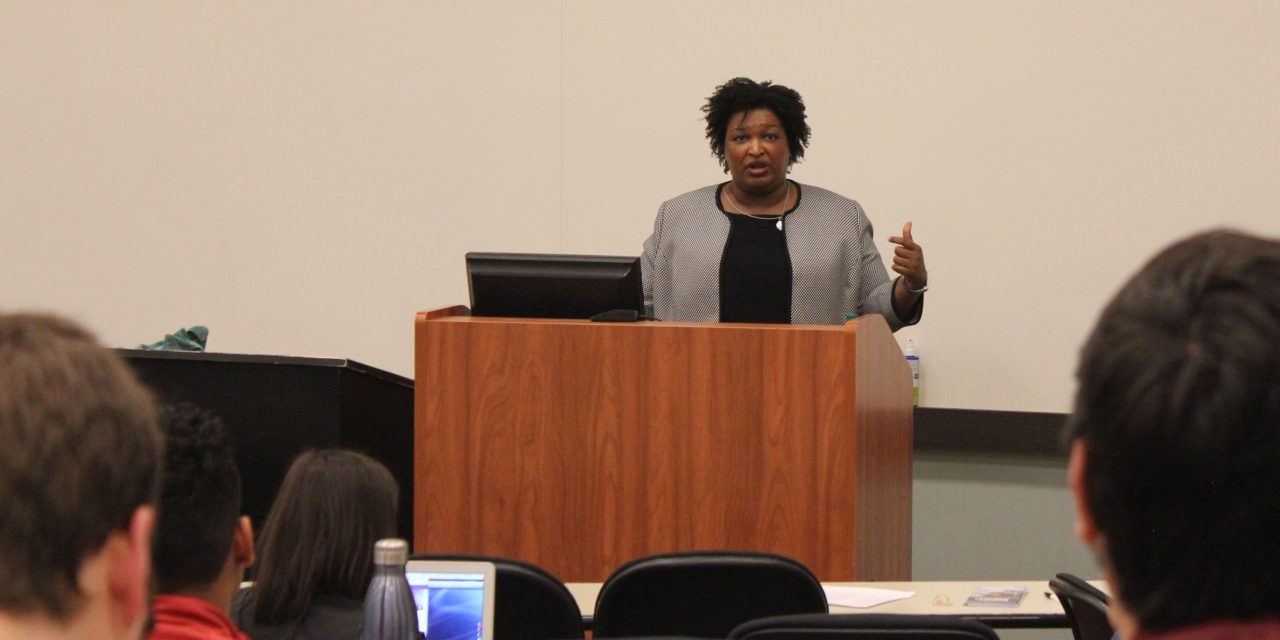With 41 days left until Election Day, Democratic gubernatorial candidate Stacey Abrams is trailing her opponent, Republican incumbent Gov. Brian Kemp, by over five percentage points in the race for Georgia’s governor mansion, according to Sept. 23 polling data.
But Abrams’ campaign isn’t necessarily the reason behind the gap, Emory University Associate Professor of Political Science Bernard Fraga said.
“Georgia is a close state, and to me, that’s completely within striking distance,” Fraga said. “It’s just a question of whether the dynamics in the state and nationally are going to change in Abrams’ favor enough to help her get over the finish line with a victory.”
Abrams and Kemp last faced off in the 2018 gubernatorial election, where Abrams lost by 1.4 percentage points. However, the 2022 midterms cannot be reliably compared to 2018 given the different political context of each election, Fraga said. He explained that Democrats will not perform as well in swing states given Biden’s “underwater” approval rating of 42.6%.
“What surprises me is that people are suggesting Abrams is somehow underperforming simply because she’s doing worse than she did in 2018, which was a wave election for Democrats,” Fraga said. “I don’t think we have a lot of strong evidence to say Abrams is doing worse than we would expect given the national environment.”

Georgia gubernatorial candidate Stacey Abrams speaks to Emory Law School Democrats at a meeting on April 4, 2018 /Ayushi Agarwal, Photo Editor
Fraga added that Abrams is primarily bringing in less votes because the gubernatorial election is heavily influenced by incumbency. Each of Kemp’s political decisions in office has shaped voters’ views of him as a governor, pushing voters to either side with or against him. Kemp’s approval ratings stand at about 53% as of press time.
“The vast majority of Georgia voters have already made up their minds, and frankly, made up their minds even before we knew who the candidates were,” Fraga said.
Emory College Republicans Chairman Robert Schmad (23C) is one of them. He wrote that Kemp “has consistently been one of the best governors in the country,” noting that he brought more jobs to Georgia and passed the heartbeat bill.
“Governor Kemp … has used his office to pursue policies conducive to tangibly improve the economic condition of this state while maintaining a conservative agenda in line with what his base’s demands,” Schmad said. “Kemp is a skilled statesman, Abrams, not so much.”
Young Democrats of Emory Co-communications Director Virginia Brown (23C) noted that Kemp’s incumbency has been beneficial so far.
“He was secretary of state, where he literally wrote the rules for the election,” Brown said. “He holds a huge advantage there. He’s got name recognition.”
The incumbent advantage is also seen in the Senate race between Sen. Raphael Warnock (D-Ga.) and his Republican challenger, U.S. Senate candidate Herschel Walker. Polling data as of Sept. 22 shows Warnock ahead of Walker by two percentage points.
Although this could suggest that Warnock has garnered more Democratic support than Abrams, Fraga said it is also vital to consider their opponents. He explained that Republican voters will likely view Kemp as a good candidate who has stood up against the more “extreme” elements of the Republican party, making them less likely to vote blue. On the other hand, Republican voters will be more inclined to vote Democratic in the Senate race because Warnock’s opponent, Walker, lacks political experience.
As a Black woman running against a white man in the Deep South, Abrams faces further strain on her campaign.
Brown said that because she is a Black woman, Abrams is having to go “above and beyond” in her campaign.
“We aren’t in a place in our society right now where we accept women and women of color as equals to white men and just men in general,” Brown said.
If Abrams were to win, she would be the first Black woman to occupy a governor’s mansion in the United States.
“We can’t separate out the life experience of these candidates from the type of campaign they’re running, and the situation that they find themselves in,” Fraga said.
Schmad, however, does not believe Abrams’ race is playing a major role in her campaign because “people are far more concerned about kitchen table issues than race and similar social flashpoints.”
Currently, Abram’s campaign is largely based on combating voter suppression and expanding the number of registered voters in Georgia, especially voters of color, Democrats and younger populations. Abrams’ voting rights organization, Fair Fight, has worked to expand Georgia’s electorate since her loss in 2018, which she attributed to voter suppression.
Discussion over Abrams’ campaign strategy made its way into national conversation. The New York Times wrote on Sept. 7 that “her struggles have some Georgia Democrats wondering if the Abrams model — seeking to expand the universe of voters to fit her politics — is truly better than trying to capture 50 percent of the voters who exist now.”
Fraga deemed this stance “inaccurate.”
“Outside observers who are not doing the work on the ground in Georgia, they’re making assumptions about Abrams, her potential base and the strategies that she’s using,” Fraga said. “For people who are living here in Georgia, I think you see a campaign that is, first of all, very well resourced, and positioning itself to try and win over those more moderate voters.”
Schmad said that focusing on voter engagement is a smart strategy for Democrats.
“Low propensity Democratic voters are vital if liberals want to win in November,” Schmad said. “It was turnout that killed them in 2018 and it very well could be their undoing again.”
Abrams has recently narrowed her focus to Black voters, especially men, who have decreased in their support for Abrams, reportedly due to factors such as Kemp’s COVID-19 response and the stability of Georgia’s economy.
In 2018, 88% of Black male voters and 97% of black female voters supported Abrams. Last week’s polls by Quinnipiac University indicate that Black men’s support for Abrams now stands at 87%, while Black women’s support dropped slightly to 94%.
Abrams’ recent campaign for Black votes is likely part of her plan to rally support from all Georgians, Fraga said. Abrams cannot afford to underperform among any of the voter demographics, and Black people make up a considerably large voter block, representing over 12% of Georgia’s population and 34.8% of registered voters.
Fraga noted that winning the gubernatorial election will rely on high turnout from groups that have historically been considered base voters, such as Black men, and appealing to enough swing voters to pull the electorate in their favor. Swing voters are interested in hearing about what candidates do differently, the economy and issues that the Democratic base typically don’t focus on, Fraga said.
“The economy has been the biggest issue,” Daniel Ren (24B), who is not currently endorsing either candidate, said. “This is personally also one of the … largest factors in whom I decide to vote for.”
Young Democrats of Emory Co-communications Director Pranay Mamileti (26C) noted that the decision to overturn Roe v. Wade and the subsequent implementation of Kemp’s six-week abortion ban has increased support for Abrams.
“It was a shock, but everyone needed it to show that without these constitutional protections, this is what’s at stake,” Mamileti said. “If Republicans do end up controlling and continuing to control state legislatures, as well as the nationwide political scene, that’s kind of where we’re headed as a country.”
However, Schmad maintains that Abrams’ focus on social and cultural issues, such as abortion, is harming her campaign. He believes most Georgians care more about the economy, which he said Kemp has improved.
“Her focus on progressive [culture] isn’t resonating with Georgians,” Schmad wrote.
Kemp is also appealing to swing voters with an “extremely smart and well positioned campaign,” Fraga added. He said Kemp has successfully balanced both Trump supporters and moderate voters who supported U.S. President Joe Biden during the 2020 election.
Kemp garnered national attention in 2020 after publicly refuting former U.S. President Donald Trump’s claims of election fraud and certifying Biden’s win in Georgia, positioning himself to likely take back the Republican voters who disapproved of Trump, Fraga said.
Fraga said that although Kemp would likely win if the election were held today, a lot can change in the 41 days left until the Nov. 8 election.
“People shouldn’t count Abrams out,” Fraga said. “They shouldn’t count any Democrat out for statewide office, just given the current partisan split in the state, but it’s clear that the Brian Kemp campaign should probably feel a lot better about their chances than Abrams does right now.”
Madi Olivier is from Highland Village, Texas, and is majoring in psychology and minoring in rhetoric, writing and information design. Outside of the Wheel, she is involved in psychology research and works for the Trevor Project. In her free time, you can find her trying not to fall while bouldering and watching Criminal Minds with her cat.






